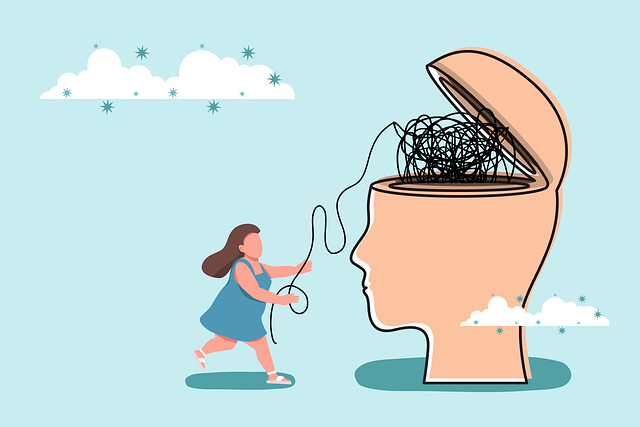In today's diverse healthcare landscape, cultural competency is essential for effective treatment, particularly in sensitive areas like Littleton Sexual Abuse Survivor Therapy. Training equips therapists with tools to respect patient and community backgrounds, understand systemic barriers, and offer tailored care using techniques like mind over matter. This personalized approach enhances healing for survivors from various ethnic, religious, and socio-economic backgrounds, also benefiting the creation of culturally resonant Mental Wellness Podcast Series content. Continuous evaluation and strategic planning are crucial for successful training programs that promote empathetic, culturally sensitive care in Littleton Sexual Abuse Survivor Therapy.
Healthcare provider cultural competency training is more than a buzzword; it’s a critical component of delivering quality care. In today’s diverse society, understanding cultural nuances is essential to address healthcare disparities and improve patient outcomes. This article explores this topic through three key lenses: the significance of cultural competency in healthcare, the positive impact on Littleton Sexual Abuse Survivor Therapy, and best practices for implementing and evaluating effective training programs.
- Understanding Cultural Competency in Healthcare: A Necessity for Quality Care
- The Impact of Cultural Sensitivity on Littleton Sexual Abuse Survivor Therapy
- Implementing and Evaluating Effective Training Programs for Healthcare Providers
Understanding Cultural Competency in Healthcare: A Necessity for Quality Care

In today’s diverse healthcare landscape, cultural competency is no longer a luxury but a necessity for delivering quality care. It involves understanding and appreciating the unique cultural backgrounds, beliefs, and values of patients and communities, especially those from marginalized or underrepresented groups. For instance, in the context of Littleton Sexual Abuse Survivor Therapy, cultural sensitivity is crucial to creating a safe and supportive environment for survivors from varied ethnic, religious, and socio-economic backgrounds. By adopting mind over matter principles, therapists can facilitate emotional regulation and self-esteem improvement, fostering healing and recovery.
Cultural competency training equips healthcare providers with the skills to navigate complex interpersonal dynamics, avoid assumptions, and provide patient-centered care. This is particularly relevant when addressing sensitive issues like sexual abuse, where cultural norms and taboos may influence a survivor’s willingness to seek help or share their story. Through continuous learning and self-reflection, healthcare professionals can better understand the impact of systemic barriers and unconscious biases, ensuring that all patients receive respectful, equitable, and culturally responsive care.
The Impact of Cultural Sensitivity on Littleton Sexual Abuse Survivor Therapy

Cultural sensitivity plays a pivotal role in the effectiveness of Littleton Sexual Abuse Survivor Therapy. When healthcare providers are trained to recognize and appreciate the diverse cultural backgrounds, beliefs, and values of their patients, it significantly enhances the therapeutic process. This is particularly crucial for survivors of sexual abuse, who often come from varied ethnic, religious, and socio-economic contexts, each with unique understandings of trauma and healing.
For instance, a provider’s ability to offer crisis intervention guidance tailored to a survivor’s cultural framework can make all the difference in their journey towards mental wellness. This might involve incorporating specific cultural practices or traditions into therapy sessions, ensuring the survivor feels understood and supported throughout their healing process. The Mental Wellness Podcast Series Production can also benefit from this cultural competency, creating content that resonates with a broader audience by addressing these diverse perspectives.
Implementing and Evaluating Effective Training Programs for Healthcare Providers

Implementing and evaluating effective training programs for healthcare providers is a multifaceted process that requires careful planning and continuous assessment. At the core of this lies ensuring that training aligns with current best practices and addresses critical areas like cultural competency, especially in specialized fields such as Littleton Sexual Abuse Survivor Therapy. A robust program should not only educate providers about diverse cultural backgrounds but also equip them with practical tools for effective communication and empathetic care.
Regular evaluation is key to gauging the impact of these programs. This involves assessing both knowledge retention and skill application through pre-and post-training tests, feedback from participants, and case study analyses. Incorporating elements like Coping Skills Development, Positive Thinking, and Self-Awareness Exercises into training curricula can enhance providers’ ability to connect with patients from varied cultural backgrounds. Such exercises not only foster understanding but also promote personal growth among healthcare professionals.
Cultural competency training is a vital tool in enhancing healthcare services, especially for marginalized communities like sexual abuse survivors. As demonstrated by the success of Littleton Sexual Abuse Survivor Therapy, sensitive and culturally aware practices significantly improve patient outcomes and overall well-being. Implementing effective training programs equips healthcare providers with the skills to navigate diverse cultural landscapes, ensuring every patient receives respectful, equitable, and quality care. This is essential in building inclusive health systems that foster trust and healing.














